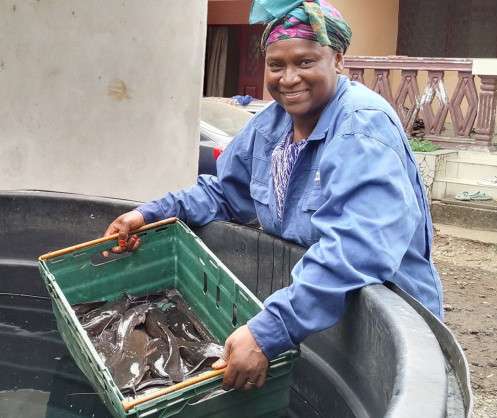Business
Cameroon scales up aquaculture with AfDB-funded catfish initiative

Cameroon’s fish farming sector is witnessing a major boost following the rollout of the Livestock and Fish Farming Value Chain Development Project (PD-CVEP), a €84 million initiative funded by the African Development Bank (AfDB) and implemented by the Ministry of Livestock, Fisheries and Animal Industries, a statement from the bank said on Wednesday.
The project introduces an improved strain of African catfish (clarias), developed by the Agricultural Research Institute for Development, to accelerate growth and improve profitability for farmers. The new breed grows faster, has lower fat content, and a higher survival rate than older varieties. While previous strains required up to nine months to reach market size, the improved catfish reaches 350–500 grammes in just five to six months, with fry survival rates of 80–85% compared to 60% before.
Since October 2024, 50 selected hatcheries have received 2,600 broodstock for the pre-extension phase, producing over 115,000 fry for farming. “The support given by the project is encouraging us to go further. We have real motivation to continue what we’ve started,” said Fanta Njifondjou Oumarou, a fish farmer from Limbé.
In addition to genetic improvements, the initiative provides training for 280 farmers nationwide, covering hatchery management, cage farming, feed production, and business skills. The objective is to strengthen technical capacity, boost resilience, and raise annual national fish production by 10,000 tons by 2027.
To sustain momentum, an AfDB mission in April called for faster distribution of improved broodstock. Under a new agreement, 15,000 broodstock, including 12,000 clarias and 3,000 tilapia, will be supplied to farmers, supported by a rigorous monitoring system and digital reporting tools.
The benefits extend beyond farms. Fish sellers and restaurants in cities like Douala report higher demand and better quality. “The flesh stays firm after grilling and tastes better. Customers love it, and my income has grown,” said Moukoudi Mbappé Dolie, who sells grilled fish.
The project also addresses poor market infrastructure. Upgrades at major markets, including Deïdo and Dakar, will feature hygienic counters, water supply, and ice storage. “Clean and secure counters will help us preserve the fish better and sell with dignity,” said vendor Marthe Epoko.
Officials say the programme aligns with Cameroon’s rural transformation strategy. “We will provide close support to hatcheries to ensure quality and traceability. This project is crucial for the future of aquaculture,” said Victor Viban Banah, regional delegate of the Livestock Ministry.


